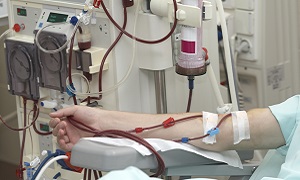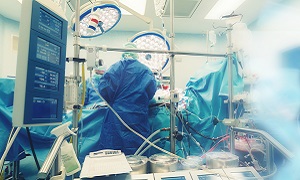Best Doctors in India for Amyloidosis Treatment
Best Hospitals in India for Amyloidosis Treatment
- City: New Delhi, India
Hospital Highlights:
- Equipped with 650 beds, BLK-Max Super Speciality Hospital is the largest stand-alone private sector hospital in Delhi.
- With over 1500 healthcare providers and 150 globally renowned super specialists, the hospital is one of Asia’s largest BMT Centres. The hospital is known for having some of the best cancer doctors in the country.
- The hospital is NABH and NABL accredited and was inaugurated by the first Prime Minister of India. Pt. Jawahar Lal Nehru.
- City: Hyderabad, India
Hospital Highlights:
- Located in the vibrant city of Hyderabad, Apollo Health City is a world-renowned medical facility that provides outstanding care and treatment to patients coming from different parts of the world.
- Founded in 1988, this 550-bed multispecialty hospital with 50 specialties and 12 Centres of Excellence continues to deliver outstanding outcomes for patients with the simplest to the most complicated medical conditions.
- Backed by the latest medical equipment and a dedicated team of professionals, the hospital provides comprehensive treatment across various specialties including, cardiology, critical care, neurosciences, cancer, orthopedics, gynecology, ENT, transplants, gastroenterology, etc.
- Apollo Health City is a cutting-edge healthcare facility that combines various facilities under one roof. These may include state-of-the-art physical medicine, rehabilitation, and wellness services with education, research, telemedicine, innovative medical devices, disease management programmes, and medical talents.
- The hospital is known for offering top-notch cancer treatment accompanied by cutting-edge facilities and technology.
- The hospital also offers a broad spectrum of cosmetic procedures that improve not just appearance but also comfort.
- In 2011, Apollo Health City was the recipient of the Asian Hospital Management Award (AHMA).
- In 2013, the Government of India recognized Apollo Health City as the top medical tourism destination in the country.
- City: Mumbai, India
Hospital Highlights:
- Kokilaben Dhirubhai Ambani Hospital, Named after the wife of Indian industrialist Dhirubhai Ambani, the founder of Reliance Industries, this is one of the top hospitals in Mumbai. This 750-bed multi-specialty hospital became operational in 2009. Known as one of India’s most advanced tertiary care facilities, the hospital is designed to raise India’s global standing as a healthcare hub, with an emphasis on excellence in clinical services.
- Kokilaben Dhirubhai Ambani Hospital uses Protocol and Care Pathway based treatment models to ensure the best outcomes for patients.
- The hospital represents a confluence of top-notch talent, cutting-edge technology, state-of-the-art infrastructure, and, most importantly commitment.
- The hospital also holds the accreditation of the NABH, NABL, CAP, and JCI.
- The hospital has been recognized as the No. 1 Multispecialty Hospital in Mumbai and the West Zone for the fifth year in a row in 2020 by The Week.
- City: Chennai, India
Hospital Highlights:
- Apollo Cancer Centre in Teynampet, Chennai is one of the best super speciality hospitals in India. It is the country’s first ISO-certified healthcare facility.
- Additionally, it is the first hospital in Chennai and the first oncology hospital in India to receive NABH accreditation.
- The hospital provides advanced tertiary care in oncology, orthopedics, neurology and neurosurgery, head and neck surgery, and reconstructive and plastic surgery.
- Additionally, it offers specialized healthcare of international standards with results comparable to those of the best hospitals in the world.
- It is outfitted with 300 beds, the newest and greatest technology, a large pool of highly qualified specialists, and a committed team of medical and paramedical professionals.
- It is one of the first few medical facilities in India to offer comprehensive cancer care. A team of skilled medical, surgical, and radiation oncologists makes up the Tumour Board, which is a component of the complete treatment planning system. After reviewing reported cases, the Board determines in concert with diagnostic specialists what course of action is best for each individual patient. The panel is further supported by dieticians, medical counselors, speech therapists, and other pertinent specialists.
- The hospital launched the first ExcelsiusGPS® Spine Robot in South India and has completed over 50 surgeries till date.
- It is also one of the few cancer hospitals in India to offer Cyber Knife therapy. Till now it has completed 1320 Cyber Knife therapies.
- The institution is also one of the few in India with the capacity to do transplants and find a prospective unrelated donor. The hospital has performed over 1000 BMTs till now.
- Furthermore, it has an exceptional milestone of performing exultant Micro vascular free tissue transfer and Aesthetic surgeries on more than 1000 patients with success.
- City: Chennai, India
Hospital Highlights:
- Apollo Hospitals, Chennai, is one of the best hospitals for heart care in India. Over the years, Apollo has expanded all over India, as a healthcare chain.
- India’s first ‘Only Pancreas’ transplant was performed in Apollo Hospital. The hospital is known for successfully performing Asia’s first en-bloc combined heart and liver transplant, and over the years, it has attained a remarkable achievement in the global healthcare space. Around 3-4 organ transplants are performed in the hospital per day.
- Equipped with over 500 beds, this hospital in Chennai was established in 1983 and since then has been among the most preferred hospital for patients from all over the world.
- The hospital holds accreditation of the NABH and JCI and is the first hospital in India to be ISO 9001 and ISO 14001 certified. It is also the first South Indian Hospital to receive subsequent reaccreditation from the JCI USA 4 times.
- City: Chennai, India
Hospital Highlights:
- Established in 1999, Gleneagles Global Hospital, Chennai, is one of the top healthcare facilities in Southern India. It is part of the Gleneagles Hospital Chain, which is the fourth largest healthcare chain in the country. The hospital specializes in multi-organ transplants of kidneys, liver, lungs, heart, etc.
- The hospital has an excellent infrastructure and state-of-the-art lab and equipment set-up. The hospital boasts cutting-edge technologies, a highly skilled team of doctors and surgeons, and trained support staff. Located in Perumbakam, Chennai, it is one of India’s premier health care destinations. The hospital has performed some of the most complex surgical and clinical procedures in India including multi-organ transplantations.
- The hospital’s lung transplantation program is one of the best in the country. The hospital is known for having performed India’s first single lung transplant and first minimal invasive lung transplant. It is also the only Indian hospital to be associated with King’s College Hospital, London, United Kingdom for liver transplantations.
- City: Hyderabad, India
Hospital Highlights:
- KIMS Hospital (a brand name of Krishna Institute of Medical Sciences) is one of the largest and best multi-speciality hospitals in Hyderabad. The hospital provides various treatments to an enormous number of patients.
- The hospital has a capacity of more than 3000 beds. KIMS Hospitals offers different healthcare services in more than 25 specialities and super specialities.
- The hospital is equipped with modern medical equipment and technology. It has robotic equipment to provide minimal invasive techniques for patients.
- The hospital is aimed at providing world-class healthcare facilities and services at an affordable cost for patients.
- The various specialities and departments of the hospital include neurosciences, gastroenterology & hepatology, robotic science, reproductive sciences, dental science, oncological sciences, organ transplantation, heart and lung transplantation and mother and child care.
- City: Kolkata, India
Hospital Highlights:
- Established in 2003, Apollo Gleneagles Hospitals is a 750-bed multispecialty tertiary care hospital situated in Kolkata.
- With 33 Centres of Excellence and more than 50 specialties, Apollo Gleneagles Hospitals, Kolkata is capable of handling all sorts of patients.
- This tertiary care hospital, which is a 100% subsidiary of Apollo Hospitals Enterprise Ltd., India, is regarded as one of Kolkata’s top hospitals.
- The facility is a complete blend of cutting-edge technology, state-of-the-art infrastructure, and genuine hospitality.
- Focusing on numerous specialties, the hospital provides all-inclusive medical treatments supported by cutting-edge technology and a staff of highly qualified medical specialists.
- Patients across the globe come to Apollo Gleneagles Hospitals Kolkata for their treatment. Moreover, international patients receive full attention and assistance for their treatment and are provided with a hassle free experience.
- Apollo Gleneagles Hospitals, Kolkata is the only hospital in Eastern India to hold the Joint Commission International (JCI) certificate.
- It is also the only hospital in Kolkata to hold the NABL accreditation in six different categories, which includes Clinical Biochemistry, Clinical Pathology, Hematology & Immunohematology, Microbiology & Serology, and Histopathology & Cytopathology.
- Furthermore, Apollo Gleneagles Hospitals, Kolkata is known for performing the first ever Reverse Shoulder Prosthesis Replacement in East India.
- City: Bengaluru, India
Hospital Highlights:
- Established in 1991, Manipal Hospital, Old Airport Road, Bangalore is the flagship facility of the Manipal Hospitals Group, which is one of the largest networks of Multispecialty Private Hospitals in India.
- The facility is well-known for its state-of-the-art technology, performance-driven, patient-centric, and evidence-based approach.
- The facilities offered at Manipal Hospital meet the highest international standards, allowing the hospital to attract a large number of national and international patients.
- Their expertise encompasses the diagnosis and treatment of a wide range of diseases in several specializations that address both simple as well as complex medical procedures.
- There are total 600 beds accessible in the hospital for the in-patients so they may heal while being closely watched after by the medical team. In addition, it has 144 critical care units, including NICUs, ICCUs, and ICUs. Apart from that, the hospital also offers 20 contemporary, modular state-of-the-art operating rooms with all the amenities needed.
- The hospital has several departments that are overseen by highly skilled, certified, and experienced medical experts.
- One of the best departments in the hospital is that of the Cancer department which is known for its advanced cancer diagnosis and treatment facilities such as Intracavitary Chemotherapy, Biological Therapy, HIPEC, PIPEC, Nuclear Medicine, Radiation Therapy, etc.
- It is one of the few hospitals in Bangalore that provides full range of pediatric services, including pediatric emergency services, pediatric gastroenterology, pediatric neurology, pediatric cardiology, pediatric orthopaedics, pediatric allergies, pediatric immunology, and infectious diseases.
- Furthermore, Manipal Hospital, Old Airport Road, Bangalore is also regarded as one of the best hospitals for bone and spine related disorders.
- City: Mumbai, India
Hospital Highlights:
- Established in 2016, Apollo Hospitals, Navi Mumbai is one of Maharashtra’s most advanced multispecialty hospital. This 500-bed hospital provides sophisticated treatments and integrated super specialty services under one roof.
- The hospital features a cutting-edge infrastructure that houses 13 state-of-the-art operating rooms, advanced laboratory and medical diagnostics, and 120 ultra-modern I.C.U. beds, including N.I.C.U. and P.I.C.U., monitored round the clock by critical care specialists.
- With 57 specialties and subspecialties, the hospital boasts a team of renowned medical specialists who offer accurate diagnosis and treatment with easy accessibility to their patients.
- Additionally, the hospital offers highly customized, individualized health check programs that are made to fit each person’s needs in terms of lifestyle.
- Apollo Hospitals, Navi Mumbai has been accredited by both the National Accreditation Board for Hospitals and Healthcare Providers (NABH) and the Joint Commission International (JCI).
- Apollo Hospitals Navi Mumbai has been awarded the “Best Practices-International Services Award” at the annual awards for service excellence and operations excellence.
AMYLOIDOSIS
Amyloidosis is a condition in which an abnormal protein known as amyloid builds up in your tissues and organs. It is a serious health issue, which can lead to even life-threatening organ failure.
Although amyloid is not found in the body normally, it can be formed from other different types of protein. Organs that are affected include the kidneys, heart, liver, spleen, nervous system as well as digestive tract. Some types of amyloidosis also occur as complications of other diseases, and these should improve with treatment of the underlying disease.
Symptoms
In many cases, symptoms are not noticeable till the condition is at an advanced stage. Signs and symptoms are going to depend on which part of your body is affected. Some of the symptoms may include any of the following:
- Swelling of your ankles and legs
- Severe weakness and fatigue
- Unable to lie down in bed due to difficulty in breathing
- Shortness of breath with minimal exertion
- Tingling, numbness or pain in your hands or feet, especially in your wrist
- Enlargement of the tongue
- Unintentional weight loss of over 4-5 kilograms
- Diarrhea, sometimes with blood or constipation
- Irregular heartbeat
- Difficulty swallowing
- Skin changes, such as thickening or easy bruising
If you persistently experience any of the signs and symptoms, associated with amyloidosis, you should see your doctor.
Types, causes & risk factors
Many different proteins exist, which can lead to deposits of amyloid, though only a few have been linked to major health problems. The type of amyloidosis you have is determined by the type of protein and where it collects in your body. The deposits may collect throughout your body or in just one area.
The different types of amyloidosis include the following:
AL amyloidosis (immunoglobulin light chain amyloidosis) – This is the most common type of amyloidosis and therefore is also known as primary amyloidosis. AL stands for “amyloid light chains,” which is the type of protein that is responsible for this condition. The cause is unknown, but it occurs when your bone marrow makes abnormal antibodies that can’t be broken down. It’s linked with a blood cancer known as multiple myeloma. It can affect your kidneys, liver, heart, intestines, as well as nerves.
AA amyloidosis – Previously this condition was also known as secondary amyloidosis. It is caused by another chronic infectious or inflammatory disease which can be rheumatoid arthritis, ulcerative colitis, or Crohn’s disease. It mostly affects your kidneys, though in some cases, it may also affect your digestive tract, liver, or heart.
Dialysis-related amyloidosis (DRA) – This type is generally more common in older adults and people who have been on dialysis for over 5 years. This type of amyloidosis is caused by deposits of beta-2 microglobulin that build up in the blood. Deposits can build up in various tissues, though it most commonly affects the bones, joints, and tendons.
Hereditary amyloidosis – This is a rare form that is passed down through families. It is known to generally affect the liver, nerves, heart, as well as kidneys. There are also several other genetic defects that are linked to a higher chance of amyloid disease.
Age-related (senile) systemic amyloidosis – This is caused when there is a huge deposit of normal TTR in the heart and other tissues. It occurs mostly among older men.
Organ-specific amyloidosis – This is caused by deposits of amyloid protein in single organs, including the skin.
Some types of amyloid deposits have also been linked to Alzheimer’s disease, but the brain is rarely known to be affected by amyloidosis.
Amyloidosis is more common among men than in women. Your risk for amyloidosis generally goes up as your age increases. Amyloidosis also affects around fifteen percent of patients with a form of cancer which is called multiple myeloma.
Diagnosis
Sometimes, amyloidosis can get overlooked as the signs and symptoms can mimic those of more common diseases.
Early diagnosis can help to prevent further organ damage. However, a precise diagnosis is important as treatment is going to vary depending on your specific condition. Several tests can be required which include the following:
Blood and urine tests
Biopsy
Images
Echocardiogram
This technology uses sound waves which create moving images that show how well your heart is functioning. It can also show heart damage which may be specific to particular types of amyloidosis.
Magnetic resonance imaging (MRI)
MRI uses radio waves and a strong magnetic field for creating detailed images of the tissues and organs in your body. These can help your doctor assess the structure and function of your heart.
Nuclear imaging
In this test, tiny amounts of radioactive material, which are also known as tracers, are injected into a vein. This can reveal early heart damage which is caused by certain types of amyloidosis.
Treatment
There is no permanent cure yet known, for amyloidosis. But treatment can help to manage the signs and symptoms and stop or slow further production of amyloid protein. If the amyloidosis has been triggered by another condition, such as rheumatoid arthritis or tuberculosis, then treating the underlying condition may help.
Treatments generally include medications and surgery.
Chemotherapy
Many of the medicines which are used to treat some forms of cancer are used in AL amyloidosis as they might help to stop the growth of abnormal cells producing the protein leading to the formation of amyloid.
Heart medications
Surgical and other procedures
Autologous blood stem cell transplant – In this procedure, your own cells are collected from your blood through a vein. They are stored for a short time while you receive high-dose chemotherapy. The stem cells are then returned to your body through a vein. This treatment is generally appropriate for people whose disease is not advanced and whose heart is not affected much.
Dialysis
Organ transplant
Complications
Amyloidosis can lead to serious complications in the following organs:
Heart – Amyloid reduces the ability of your heart to fill with blood between heartbeats. As less blood is pumped with each beat, this can lead you to experience shortness of breath. If amyloidosis affects the electrical system of your heart, the heart rhythm may get disturbed. Heart problems which are related to amyloid can become life-threatening.
Nervous system – You might experience pain, numbness, or tingling on your fingers. You might also experience numbness, lack of feeling, or a burning sensation in your toes or the soles of your feet. If amyloid affects the nerves controlling your bowel function, you may experience periods of alternating constipation or even diarrhea. If it affects the nerves that control blood pressure, you may feel faint if you stand up too quickly.
Kidneys – Amyloid can harm the filtering system of the kidneys, and this can cause the protein to leak from your blood into your urine. The kidneys’ ability to remove waste from the body gets lowered, which can result in kidney failure and may require dialysis.

















